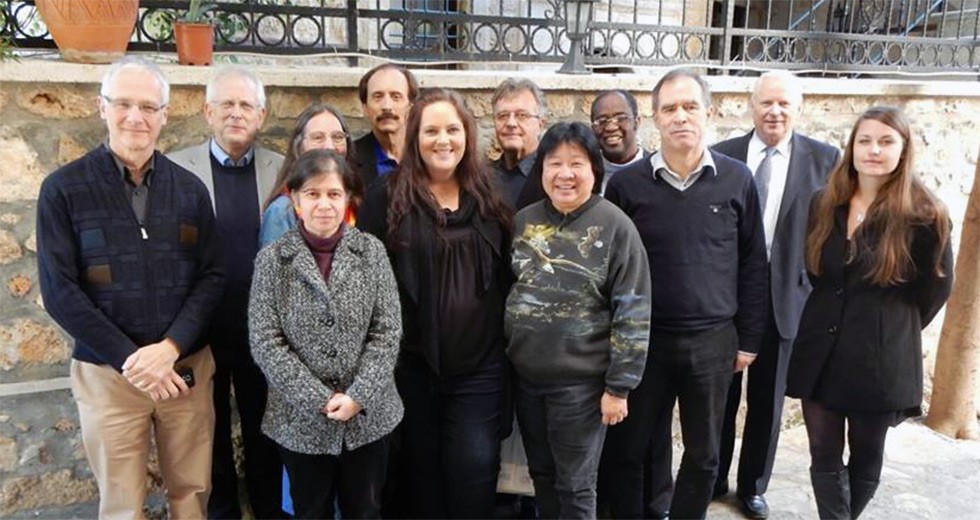Reformed-Pentecostal dialogue focuses on mission and salvation
Posted on January 5, 2016 by Phil Tanis

The second round of meetings in the Reformed-Pentecostal Dialogue took place in December at the St. Paul Cultural Center in Antalya, Turkey, under the theme “Ministering to the Needs of the World: Mission and Salvation.”
“Folks from Reformed and Pentecostal churches relate to each other in a variety of contexts around the world. Those interactions are often marked by false assumptions or stereotypes that folks on one side make about the other. The dialogue is important because it allows us to overcome the stereotypes and dig into the depths of each tradition,” said Karla Ann Koll, co-chair of the dialoge from the Reformed delegation.
Papers from both perspectives were presented by Veli-Matti Kärkkäinen (Pentecostal) and Setri Nyomi (Reformed).
After placing mission at the center of Pentecostal spirituality, Kärkkäinen highlighted theological factors which create and sustain the passionate, missional orientation of Pentecostals: Christ-centered “Full Gospel,” eschatological urgency and the Spirit of empowerment. This was followed by an inquiry into the nature and implications of Pentecostalism’s holistic and comprehensive missionary vision.
Discussion on the presentation included themes like evangelism and proclamation, social concern and care and the scope of missionary activity. Kärkkäinen also dealt with what he called “the biggest challenge facing Pentecostal mission,” namely religious pluralism and interfaith relations. At the end of the presentation Kärkkäinen offered some self-critical reflections on potential liabilities and vulnerabilities that may be seen in the Pentecostal understanding of mission.
Nyomi first outlined the concepts of mission and salvation from a Reformed perspective. He then offered some views on the relationship between them by pointing out three elements of mission considered important for most African churches: evangelism, mediating life, contributing to life-giving initiatives and structures. By responding in these and many other ways to God’s love, Christians fulfill the Lord’s call to be the salt and light of their communities (Matt 5:13-16), said Nyomi.
He referred to John Calvin to illustrate the Reformed interest in issues of justice, including environmental care as part of mission and gave a brief overview of the socio-cultural realities within which Africans engage in mission. The presentation concluded that for Reformed Christians salvation results in gratitude to God which leads to a desire to engage in the mission of God (missio Dei). That mission is holistic if it is directed to the totality of life: proclaiming and living the gospel, while addressing life issues about which God cares.
During the first two days of their meeting, the teams discussed each paper in plenary. Each team then raised questions to the other. Thus similarities and differences in the approaches could be further analyzed and refined. Participants were encouraged to share examples of how mission was undertaken within their specific contexts.
The Pentecostal team raised questions that focused on the role of evangelism as proclamation in mission work and its aim, the concept of conversion in Reformed mission and the motivation for mission to migrants and to refugees. Questions from the Reformed side focused on the content or meaning of salvation and the invitation to faith, the issue of proselytism, the place of dialogue with people from other faiths in Pentecostal understanding and the relationship between mission and verbal evangelism. At times participants were encouraged by how close together they were on these subjects.
The discussions were framed each morning and evening by a time of prayer, singing, Bible readings and devotional presentations. Even though the discussions were sometimes quite pointed, all participants acknowledged that the talks were marked by an atmosphere of good will and unity in Christ that pervaded their dialogue as well as times of fellowship in prayer and over meals.
“There are ways the two traditions nurture one another that need to be acknowledged and celebrated. In his paper, Kärkkäinen cited the work of Carlos Sediles Real, a Nicaraguan Pentecostal scholar who was one of my students in Nicaragua,” said Koll. “Theological education around the world is one of the most important spaces for building ecumenical relations and a vision of the unity of the church of Jesus Christ.”
On Sunday, December 6, the participants joined St. Paul Union Church for worship with Dennis Massaro. The congregation is comprised of a range of English-speaking Christians that includes both Reformed and Pentecostal members.
According to Douwe Visser, WCRC executive secretary for theology, the overall goal of these meetings “will bring a deep reflection on mission today with a clear statement on it.”
The next session of the Pentecostal-Reformed Dialogue is scheduled to take place in early December 2016, where the focus will be on the relationship between mission and pneumatology.
The Pentecostal team included Cecil M. Robeck (co-chair), Assemblies of God, USA; Teresa Chai, Assemblies of God, Malaysia; Jacqueline Grey, Australian Christian Churches; Harold D. Hunter, International Pentecostal Holiness Church, USA; Veli-Matti Kärkkäinen, Pentecostal Church of Finland; Jean-Daniel Plüss, Swiss Pentecostal Mission.
The Reformed team was composed of Karla Koll (co-chair), Presbyterian Church USA/Costa Rica; Nadia Marais, Dutch Reformed Church in South Africa; Setri Nyomi, Evangelical Presbyterian Church in Ghana; Bas Plaisier, Protestant Church in the Netherlands; Gabriella Rácsok, Reformed Church of Hungary; Douwe Visser, Protestant Church in the Netherlands/WCRC.
 World Communion of Reformed Churches
World Communion of Reformed Churches
Thank you for the massage and may God bless you all
Thanks Folks. What an excellent way to discover commonalities between our two theological contexts. Reformation theology arose out of a need to restore biblical Christianity at at time when things were going south. Pentecostal Christianity arose to energise the church and bring about the present day reality of the move the Holy Spirit. We need to continue this conversion if only to reinvigorate the call to reach the lost. my thoughts.